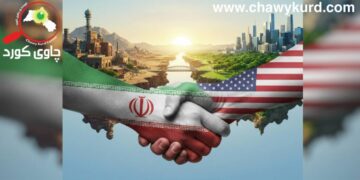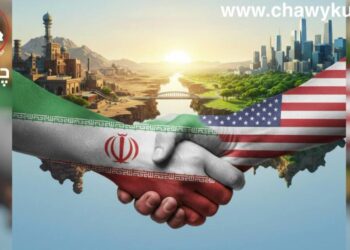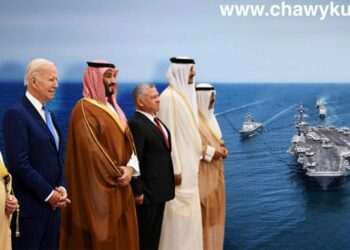Iraqi Who Once Killed Americans Is a U.S. Dilemma as He gains Political Power.Washington weighs whether to sanction Iran backed politician Qais al-Khazali in Iraq as it moves to check Tehran’s power across the Middle East.
Qais al-Khazali gained notoriety on the battlefields of Iraq, fighting to expel U.S. troops after they invaded 15 years ago. Now Khazali wants to oust American forces again, but this time through the Iraqi political system after making major gains in an election earlier this year.
Khazali’s evolution from Iran-allied outlaw to aspiring statesman illustrates Iraq’s changing political landscape and the Trump administration’s dilemma as it tries to reduce Iran’s influence in Iraq and across the Middle East.
As the U.S. tries to weaken Iran’s proxies of mainly Shiite militias that have proliferated in Iraq and Syria in recent years some of them are now boosting their profile through the very democratic process the U.S. introduced to Iraq.
Khazali’s image and profile appeared in this declassified U.S. report dating to his detention and interrogation by American forces in Iraq in the late 2000s. Khazali emerged from a parliamentary election in May with 15 seats in the 329-member assembly from just one the biggest increase of any party and was recently awarded the Ministry of Labour and Social Affairs.
Back in the U.S., the House last week passed a bill that would require the president to impose sanctions on groups that threaten stability and peace in Iraq and to designate them as terrorists. The bill, which enjoys bipartisan support, names Khazali and his militia, Asaib Ahl al-Haq, or “League of the Righteous.”
Khazali, stated that this strategy sends a bad message that when we bore arms, we were not designated, but when we go into politics we are considered a terrorist organization.
In recent weeks, Khazali, wearing the white turban and black gauze cloak typical of Shiite men of religion, has received a flurry of foreign diplomats and senior Iraqi politicians de facto recognition of his newfound status. They have included Iraq’s new Prime Minister Adel Abdul-Mahdi, seeking buy-in from competing political factions to form his cabinet. Khazali gained political power while heading a Shiite militia that Deash militants in Iraq.
Khazali’s resurgence is an outcome of the war against Deash, in which Asaib Ahl al-Haq and other Iran backed militias played a role, gaining strength and popular legitimacy. With the war winding down, those militias have looked for ways to consolidate and expand their power.
I believe that they’re trying to bite off as much of the apple as then can chew, and then bite off a little bit more. Iraqi and even some U.S. officials have lobbied against efforts to sideline Khazali and his group from politics.
Their entrance into Iraq’s political mainstream, they say, could moderate hard-line views and loosen ties to Tehran. Khazali’s critics warn against empowering one of Iran’s closest allies in Iraq, and say a group responsible for so many American deaths is beyond political redemption.
A senior U.S. official said Asaib Ahl al-Haq had won only two parliamentary seats and the rest were obtained through fraud. An Asaib party official denied that, saying forgery in the elections had in fact cost the movement seats.
The U.S. official said that behind Khazali’s political aspirations is his goal of empowering his militia in the style of Lebanon’s Hezbollah. The question is what do we do about it?
Maybe we should use the leverage we have to marginalize them and not give him the legitimacy Khazali began his opposition to the Americans as spokesman to the Mahdi Army led by Moqtada al-Sadr, now another leading Shiite politician and rival.
He broke away to form Asaib Ahl al-Haq, furnished with Iranian money and weapons. The group would claim more than 6,000 attacks against U.S. and allied Iraqi forces using improvised explosive devices, rockets, mortars and sniper fire.
In one of its most brazen operations, Asaib Ahl al-Haq gunmen posed as a U.S. security team to gain access to an American base, killing five U.S. soldiers in January 2007. Two months later, coalition forces captured Khazali.
During three years in detention, Mr. Khazali told his U.S. interrogators he had sought and received support from Iran only “because he had nowhere else to go,” according to recently declassified reports that note every detail of the prisoner, down to the birthmark near his left armpit.
He even offered to assist the U.S. in countering Iran, which he said aimed to colonize Iraq. After being released in 2010, however, he continued to receive material support from Tehran and conduct attacks against U.S. forces until they left Iraq the following year.
The rise of Deash brought U.S. troops back in 2014. But this time, the Americans found themselves on the same side as Asaib Ahl al-Haq, which had mobilized to fight the Deash as because the Iraqi security force collapsed.
Nearly one year since Iraq claimed victory over Deash, Khazali says it is time for U.S. troops to leave again. His 15 lawmakers are part of a coalition in parliament that intends to press for a drawdown of the remaining 5,200 U.S.
Colonel Sean Ryan, the spokesman for the U.S.-led coalition, said the forces were present at the Iraqi government’s request and would stay “as long as the invitation is valid for the enduring defeat of Deash.”
At the same time, Khazali has sought to broaden his appeal among a public less concerned with resistance against the Americans than corruption and poor services. During flash floods in central Iraq last month, Khazali dispatched aid and said on Twitter that Asaib Ahl al-Haq was first to act.
After years of conflict, most Iraqis want stability, and increasingly resent Iranian influence, which grew after the U.S. toppled Sunni dictator Saddam Hussein, empowering the country’s fellow Shiite majority. Khazali’s rhetoric has shifted accordingly.
Despite his insistence that U.S. combat troops leave, Khazali doesn’t object to American military trainers and advisers, provided they are invited by the Iraqi government. Iraq should be on good terms with the U.S. and neighboring countries including Saudi Arabia, he says, playing down his ties to Iran.
“We are not responsible for implementing Iranian policy in Iraq; our concern is Iraqi interests,” Khazali said.
Yet Khazali’s men were among the first to head to Syria to fight on behalf of Syrian President Bashar al-Assad as part of the “Axis of Resistance” led by Iran’s Supreme Leader Ayatollah Ali Khamenei. And last year, Khazali appeared on Lebanon’s southern border alongside Hezbollah, declaring himself ready to fight the “Israeli occupier.”
While most of the group’s supporters are from Baghdad and the country’s predominantly Shiite south,Khazali has sought to project himself as a leader for all Iraqis. Asaib Ahl al-Haq has increasingly engaged with Sunnis by appointing representatives among local tribes and fielding candidates for elections in their areas, despite being accused by human rights groups of sectarian abuses.
Khazali also has reached out to the country’s beleaguered religious minorities. The group has a women’s division that has organizes sewing workshops. Last month Khazali also met with Iraq’s Paralympic team and in September accompanied the daughter of a slain Asaib Ahl al-Haq fighter on her first day at school.
Like other powerful militias and political parties in Iraq, Asaib Ahl al-Haq has used its strength to cannibalize state resources, muscle in on lucrative contracts and expand economic activities, particularly in pharmaceuticals and oil products, according to local officials and businessmen.
Iam concern is that Khazali and others like him will bring the country into closer alignment with Tehran. “What kind of an Iraq the Americans trying to bring? about?”





























































